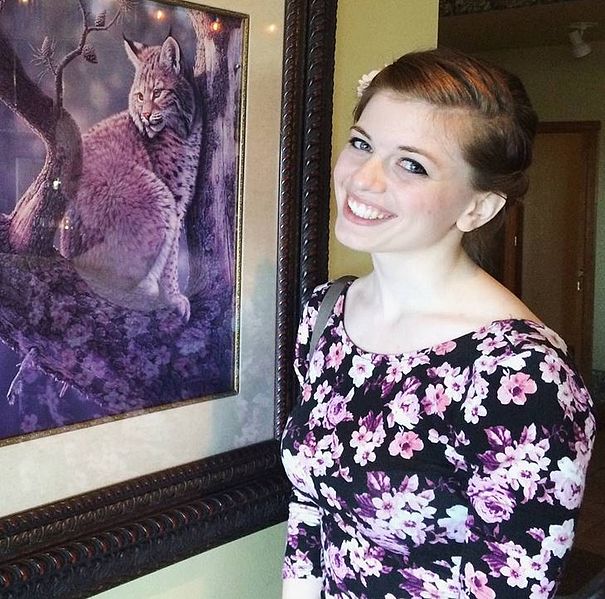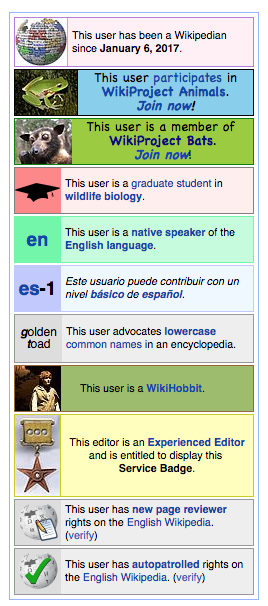
Image: File:Elysia Webb headshot.jpg, Enwebb, CC BY-SA 4.0, via Wikimedia Commons.
Elysia Webb first started editing Wikipedia as a graduate student at the University of Florida in January 2017. She improved the Wikipedia article about the Florida bonneted bat in Emily Sessa’s Wiki Education-supported course, Principles of Systematic Biology. A few months later, she reflected on our blog about the experience, writing,
“The semester that I signed up for my Wikipedia account, I surpassed a thousand edits. Now that I knew how to edit articles and had the tools to do so, I had no excuse not to.”
Now, more than a year later, Elysia continues to contribute to Wikipedia. Since that January, she has made more than 10,000 edits and has created more than 40 new articles. Elysia cites a few different reasons for why she’s stuck around. She feels a responsibility to improve articles that need work and she has the expertise to do it well.
“I have continued to edit Wikipedia because there continue to be articles that need someone’s input,” she tells Wiki Education in an interview. “I primarily work on bat articles, for example. Before I began editing Wikipedia, 3 out of 4 bat-related articles were ‘stub class’ or had only three sentences or fewer. They were really non-informative and frankly did not do justice to the fascinating lives that bats live and the impact that they have on both the natural world and ours. With the edits I’ve made over the past 18 months, about 57% of bat articles are currently stub class, which is really a significant improvement. I’ve also created articles for over 40 species of bats that were previously not represented on Wikipedia at all. However, that still leaves me with almost 900 articles that lack nearly all content and dozens more missing articles that need to be written. I’ve got my work cut out for me, certainly, and it’s the kind of self-appointed project that will be measured in years, not weeks. I try to focus on short-term goals, though, to keep this Herculean task manageable, such as creating 5 missing articles each month.”
We’ve heard from instructors that among the many student learning objectives achieved through a Wikipedia assignment, students feel inspired to delve deep into their self-chosen topics. They also gain confidence in the self-directed process that is Wikipedia editing. At the basis of being a Wikipedian is the commitment to free knowledge, as well as a love of learning.
“I find that the more I edit, the more I learn about editing, and I’m able to make more impactful changes,” says Elysia. She has refined her editing process since learning how to improve Wikipedia from Wiki Education’s resources, and has created new tools to be even more of an effective contributor.
“I set up an automated system to determine which bat-related articles get the most page views each month. Once I had that up and running, I could make targeted improvements to the content that people wanted to learn more about. I also feel more comfortable making bigger and bolder changes as I’ve gained experience. It wasn’t until 10 months after the conclusion of my Wiki Education course that I brought my first article to ‘Good Article’ status. There’s a lot of work that goes into creating a ‘Good Article,’ and you certainly have to handle a lot of criticism and feedback to make a polished product.”

A big part of what keeps her on Wikipedia, Elysia says, is her involvement in WikiProjects.
“WikiProjects are associations of editors who enjoy working on the same subjects. I’ve become particularly involved—and somewhat akin to a groundskeeper—at the Bats Task Force, which is quite young.”
Bats Task Force is made up of four Wikipedians so far, including Elysia. It’s a localized page on Wikipedia that measures what bat articles are receiving attention lately; lays out monthly goals for creating and improving certain articles; and presents a suggested layout for what information an article about a bat should include. It’s a great resource for future biology students that Elysia takes great care to maintain.
“I would advise future students to edit what they’re passionate about! Find a WikiProject and ask how you can help,” she says.
Editing Wikipedia as an assignment situates student learning in wider contexts. Students participate in knowledge production, bringing academic information (often restricted behind paywalls) to millions worldwide. Students experience increased motivation when their work has an impact outside of the classroom. They understand that their work can be accessed by any reader of English Wikipedia around the world, and feel a responsibility to get it right.
And their work can really make a difference. For example, Elysia improved the article about the Indian flying fox shortly before a Nipah virus outbreak in India.
“The flying foxes can transmit Nipah virus, and sure enough, I went to the article view history and the page views jumped dramatically from around 100 per day to up to 1,700 per day during this outbreak. It made me thankful that I had included information on diseases in the article so that people could quickly get access to the facts instead of having to sift through the dozens of research publications that I used to write the article. Preventing virus transmission can be simple and inexpensive based on the data I used to expand the article; maybe people will favor those options if they simply know that they exist instead of culling the flying foxes. While I try to pace myself in editing so that I don’t get burnt out, I’ve come to espouse the Wikipedian philosophy that ‘the deadline is now.’ The content should be written with haste and accuracy so that it exists when the need arises.”
“I also contribute in other areas from time to time based on current events and what I feel people want to know about. Immediately following the death of Barbara Bush, for example, I wrote the article for her daughter Robin, who died at 3 years old. Many people were just hearing about Robin for the first time and wanted to know more about her; the page I wrote got a quarter-million views in the month after Barbara’s death. Occasionally, I’ll come across an influential and notable woman who doesn’t have a Wikipedia article and take it upon myself to write it to combat content gender bias. Recently I wrote the article for Sherry Johnson, an incredible woman who campaigns against child marriage in the United States.”
Improving Wikipedia speaks to a big picture mission: making accurate knowledge accessible to the world.
“I enjoy editing, and I’m always surprised at how much I learn in the process of creating content for the public,” says Elysia. “It also feels altruistic—like I’m performing a public service. If someone can read an article I’ve expanded and learn that bats provide economic services to humans or I can dispel a dangerous myth that they’ve held about bats, then maybe they will care more about them and their conservation.”
“As I researcher, I acknowledge that the number of everyday people who will read a manuscript with my name on it is infinitesimal. Research is so important, of course, but it’s literally inaccessible in that it’s behind paywalls and it’s otherwise inaccessible in that it contains so much jargon that it’s unintelligible. But, thousands of people have read the articles I’ve written or expanded, and I’m building them from that same data and research written by scientists. I feel like a conduit or an interpreter; the work I do on Wikipedia feels important.”
When asked what role she thinks Wikipedia should play in higher education, Elysia says they’re a “match made in heaven.”
“Everyone wins—the students benefit by learning about scientific writing for a wider audience, and the public wins because they can access more complete and useful information. We know that pretty much everyone with internet access has used Wikipedia at some point. When Wikipedia is more reliable, thorough, and neutral, society is better for it.”
Interested in teaching with Wikipedia? Visit teach.wikiedu.org or reach out to contact@wikiedu.org with questions. Also check out Elysia’s reflections from a year ago on our blog.
